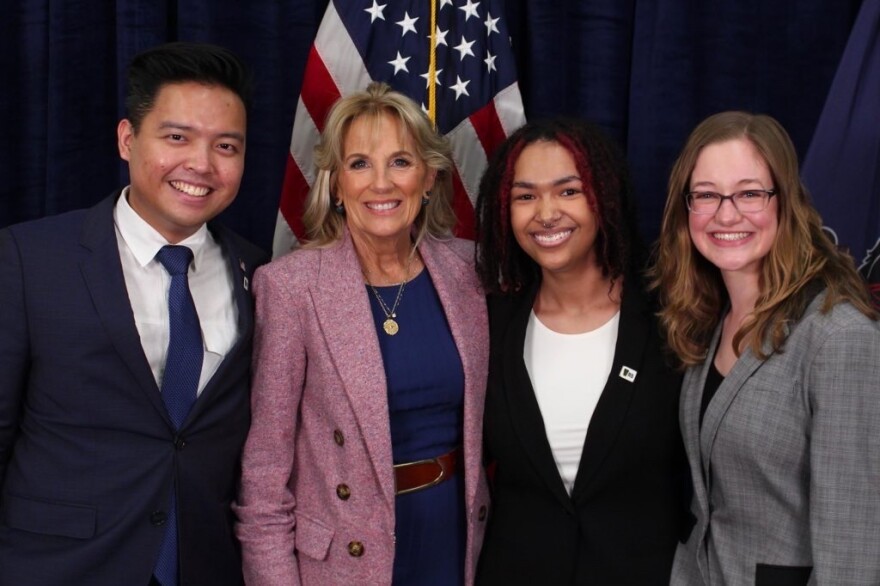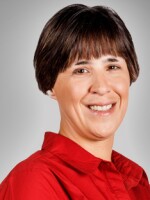BETHLEHEM, Pa. — As the dust continued to settle in the days following the Nov. 8 midterm elections, State Rep. Mike Schlossberg had a couple of thoughts on what drove youth turnout and helped shape results across the country.
“I think it was things like finances, curbing gun violence, climate change, personal rights and freedoms and bodily autonomy especially,” Schlossberg, D-Lehigh, said in a phone interview. “And excuse my French, but that age group certainly doesn’t like being told what to do, and they really don’t like being fed bulls - - -.”
- Early data shows young voters turned out big for Democrats in the midterm elections
- Muhlenberg College senior Alex Wagner said local candidates were present and engaged with students well before the midterms approached
- Wagner is the political director and secretary for the College Democrats and has aspirations to run for office after graduation in December
Schlossberg (re-elected in the 132nd House District), Nick Miller (elected to the 14th Senate District seat), U.S. Rep. Susan Wild (re-elected to Congress) and others were lauded by Muhlenberg College senior Alex Wagner as a political delegation present and engaged with students well before the midterms approached.
“I could text Schlossberg and I could ask, ‘Hey, Mike. Can you come over for just 5 minutes and speak about the importance of this election?’ and Mike was happy to come in and speak for 15 to 30 minutes and talk to a room of really active, engaged people,” Wagner said.
He believes that personal connection made the difference for hundreds of students coming of age during one of the most consequential elections of their lifetime.
“He would come in and talk about who he was, what he believed, what his job is and what it’s like being a candidate," Wagner said. "And we would just have the chance to talk back and have that intimate conversation with him. And I know that had a ripple effect. Because what happened in that room, even though it was maybe 15 people on a campus of hundreds, is that everyone was talking about it.”
For Wagner, it was also a moment that reminded him of the type of interaction established by Allentown Mayor Matt Tuerk when Tuerk was the city’s Democratic nominee for the office last year.
“During fall 2021, I was helping out with a debate between Matt and his Republican opponent at the time," Wagner said. "And I remember watching the debate, I was there with my friends, we were toward the back. And Matt just gave out his phone number in the middle of the debate. And I turned to my friends and I was like, ‘Did he just do that? If I text him, will he answer?’ And it was his actual number.”
That authenticity and engagement, Wagner said, was a lifeline for folks like him so fiercely driven to motivate other young people to register, cast their first ballots and get out the vote.
A generation shaped by turmoil
Democrats did better in the midterm elections than almost anyone anticipated, with young voters reactive to the party’s staunch defense of abortion rights and President Biden’s push on student loan forgiveness.
According to estimates from the Center for Information and Research on Civic Learning & Engagement (CIRCLE) at Tufts University, 27% of young people (ages 18-29) turned out to vote across the country. The preliminary data shows it's likely to be the second-highest youth turnout rate for a midterm election in the past 30 years, behind only the 31% turnout in 2018.
A larger narrative points to a generation that has lived through the collective trauma of school shootings, civil unrest, a pandemic and economic turmoil – issues that approached how members of Gen Z (born from the late 1990s to the early 2010s) are viewing their local elected officials and how they approach Washington.
But it was Wagner – a powerhouse in his own right – carrying those concerns forward as the political director and secretary for the Muhlenberg College Democrats and as a veteran of various campaigns, including serving as an intern for now Senator-elect John Fetterman.
For Wagner, the tension brewing in the country “was brewing before Donald Trump was elected,” but the catalyst to get involved in politics on a much deeper level started with the Jan. 6, 2021, attack on the U.S. Capitol.

“I did an unpaid internship with the Boston mayoral race back in 2021, when then-Mayor Marty Walsh was nominated for Secretary of Labor and there was a gap to fill the seat. So I decided to jump in, and I wanted to just see what it was like. This is after January 6, and I was really just horrified about what I saw. So I thought to myself, ‘I need to do something.’ And I guess that's where my instincts at the time led me,” Wagner said.
By the time he returned to Muhlenberg, Wagner was already looking into local candidates and researching campaigns. More importantly, he was thinking about those who were doing things differently to reach a generation that thinks about things in a different way.
“We registered people by doing dorm storming, which is just canvassing but in the dorms,” Wagner said. “We did tabling (additional in-person voter registration) and we talked to our friends… and we're a smaller campus, so everyone kind of knows each other. So it was easier to have those conversations where you were asking your friends ‘Did you vote?’ or ‘Have you registered?’ and then asking them to ask their friends.”
It made the push to the finish line on Election Day one of nervous anticipation.
“That passion and drive was there, and I feel really good about it,” Wagner said. “I know that a lot of my friends feel really good and we all feel proud that we did something. I remember even before the 2020 election, people really wanted to do something with their vote and they really wanted to be a part of something bigger and wanted to feel like their voice mattered.”
"I remember even before the 2020 election, people really wanted to do something with their vote and they really wanted to be a part of something bigger and wanted to feel like their voice mattered.”Muhlenberg College senior Alex Wagner
Reaching young voters where they are
Victor Shi, the director of strategy for Voters of Tomorrow, an advocacy group for Gen Z, cautioned that preliminary data on young voter turnout is not yet final. But he said it certainly made a difference in several key races as Democrats held the Senate and stopped what many political observers predicted would be a Republican red wave.
But the focus now is moving forward on outreach to a generation both increasingly engaged but also disillusioned about the divisiveness of politics, he said.
“I think engaging more young voters is two-pronged,” Shi said in a series of messages Friday. “1. Spending time where we are (online, college campuses) and 2. Democrats investing in registering us to vote and mobilizing us every day of every year, not just a couple weeks before Election Day.”
As Wagner looks to what’s next, it’s a strategy he’s keen to carry forward.
“The politicians who really go out of their way to interact with the youth vote have found a lot of success locally,” he said. “So I know that a lot of people, myself included, have thought about like, ‘Why not?’ What’s stopping me or any one of my friends or people from my generation? There's nothing stopping us from just saying, ‘I'm gonna run for something. I'm going to, and I want to go out there and make a change.”
That change might also come sooner rather than later.
“I’m graduating in December and I’m already trying to figure out what’s going on," Wagner said. "I do want to make a change in my community, and I believe that Pennsylvania right now is the way that I can have the most impact. Whether that's working for a candidate’s office, working for a current congressperson, senator or governor by being in their administration, or even running for myself…I think it's all in the cards.”


